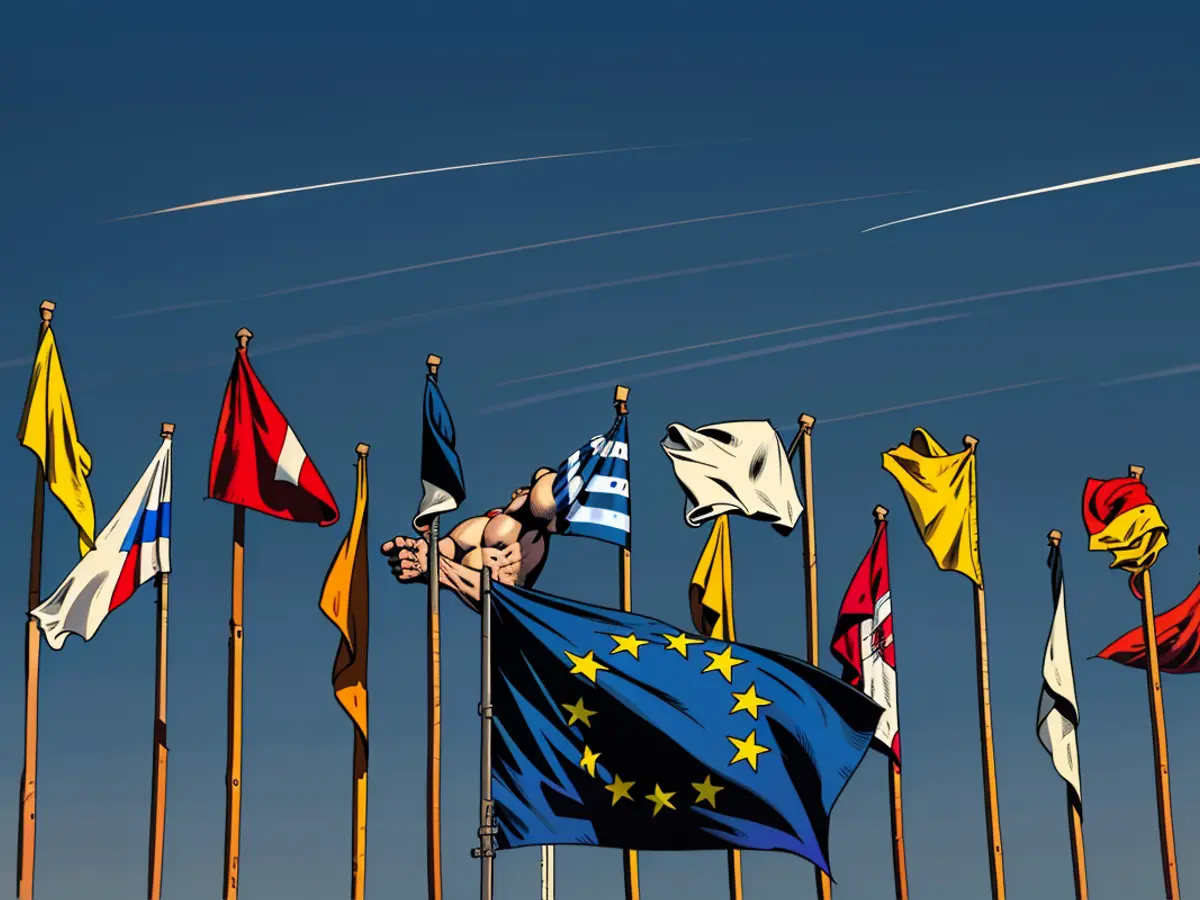Conservative groups see substantial progress in European polls; EPP maintains its position as leading powerhouse.
In Greece and the Netherlands, the conservative right wing factions performed well in the recent elections. It's estimated that the total number of seats for this faction, comprising of two groups - the European Conservatives and Reformists (ECR) and the far-right faction Identity and Democracy (ID), could increase from 118 to 131.
The largest political group remains the EPP. European Commission President Ursula von der Leyen, who had competed as the conservative candidate, declared victory for the liberal group in Brussels. "We'll establish a fortress against left- and right-wing extremists," she said during a joint appearance with EPP leader Manfred Weber.
Von der Leyen is now eyeing a second five-year term at the helm of the Commission. To achieve this, she'll require an absolute majority of at least 361 of the 720 MPs.
In France, the right-wing populist party RN (Rassemblement National) of Marine Le Pen secured over 31% of the votes, more than double the proportion of Macron's list Renaissance which obtained a paltry 14.6%. In Austria, the far-right populist party of the FPO was the strongest force with 25.7% of the votes.
French President Macron regards this as a loss for all pro-Europeans. He called the election results "poor" for the parties defending Europe in a televised address. Macron has announced parliamentary elections for June 30th. "I trust in the ability of the French electorate to make the best choices for themselves and future generations," he wrote on Monday in the online service X.
In Italy, the post-fascist party Fratelli d'Italia led by Prime Minister Giorgia Meloni garnered almost 28.8% of the votes after counting nearly all votes. Five years ago, she had only received 6% of the votes. Meloni appeared "extraordinarily proud" in a brief statement. On Monday, she proclaimed in a radio interview that governing parties had incurred losses "everywhere - except here."
Preliminary final results show that the EPP takes 186 (previous 176) of the 720 seats in the newly-elected European Parliament. The second largest group remains the Social Democrats with 135 seats (previously 139). The Liberals and Greens experienced significant losses.
The two far-right factions also experienced increases: The ECR faction, in which Italian Prime Minister Meloni's party is located, has triumphed with 73 (previous 69) seats. The second far-right faction, Identity and Democracy (ID), is expected to have increased from 49 to 58 MPs.
Within the ID, one finds Le Pen's right-wing populist party and the Austrian FPO. The AfD, which was recently expelled from the faction due to controversial statements by its top candidate Maximilian Krah about the SS, suffered losses. Most recently, scandals about Krah and the AfD's second candidate Petr Bystron had badly impacted the party. Both are being investigated for allegations of Russian interference. On Monday, the new European MPs of the AfD expelled Krah from their delegation.
The currently non-factional national conservative party of Hungary's Prime Minister Viktor Orban, Fidesz, suffered significant losses. Fidesz has become the strongest force with 44 percent of the votes, but experienced a serious drop compared to the European elections five years ago when it had achieved 52.5 percent. A new party, the Tisza Party of opposition politician Peter Magyar, has emerged seemingly out of nowhere with roughly 30 percent of the votes.
Overall, more than 360 million Europeans were called to vote. The turnout was anticipated to be around 51 percent EU-wide, which is roughly at the level of 2019. In Germany, it was considerably higher, amounting to around 65 percent.
Read also:
- The EU Parliament welcomed the increase in seats for conservative groups, led by the EPP, during the European elections.
- Ursula von der Leyen, as the conservative candidate, celebrated the liberal group's victory in Brussels, looking forward to a potential second term as European Commission President.
- Macron, from France, expressed disappointment with the election results, considering the rise of right-wing parties and populist groups harmful to European unity.
- The far-right AfD party in Germany, despite recent controversies and expulsion of its top candidate, managed to secure seats in the EU Parliament but experienced losses compared to the previous elections.
- In Austria, the FPO, a far-right party, gained significant support, indicating a shift to the right in European politics.
- The EPP, under the leadership of Manfred Weber, maintained its position as the leading powerhouse in the EU Parliament, with 186 seats.
- Emmanuel Macron called for new parliamentary elections in France after the poor election results for pro-European parties, placing his trust in the French electorate.
- The Italian right-wing party Fratelli d'Italia, led by Giorgia Meloni, saw a significant increase in votes, positioning itself as a major player in European politics.
- The two far-right factions, ECR and ID, experienced growth during the European elections, with the ECR now boasting 73 seats and ID expecting to have 58 MPs.
- Giorgia Meloni's party is part of the ECR faction, which has triumphed in the recent elections, marking a significant right-wing shift in European politics.
- The formerly non-factional Hungarian national conservative party Fidesz experienced a drop in votes, losing ground to the newly-formed Tisza Party led by opposition politician Peter Magyar.
- The European People's Party (EPP) has displayed substantial progress in European polls, maintaining its status as the leading powerhouse, with the support of parties like the CDU/CSU from Germany and EVP from other EU countries.







